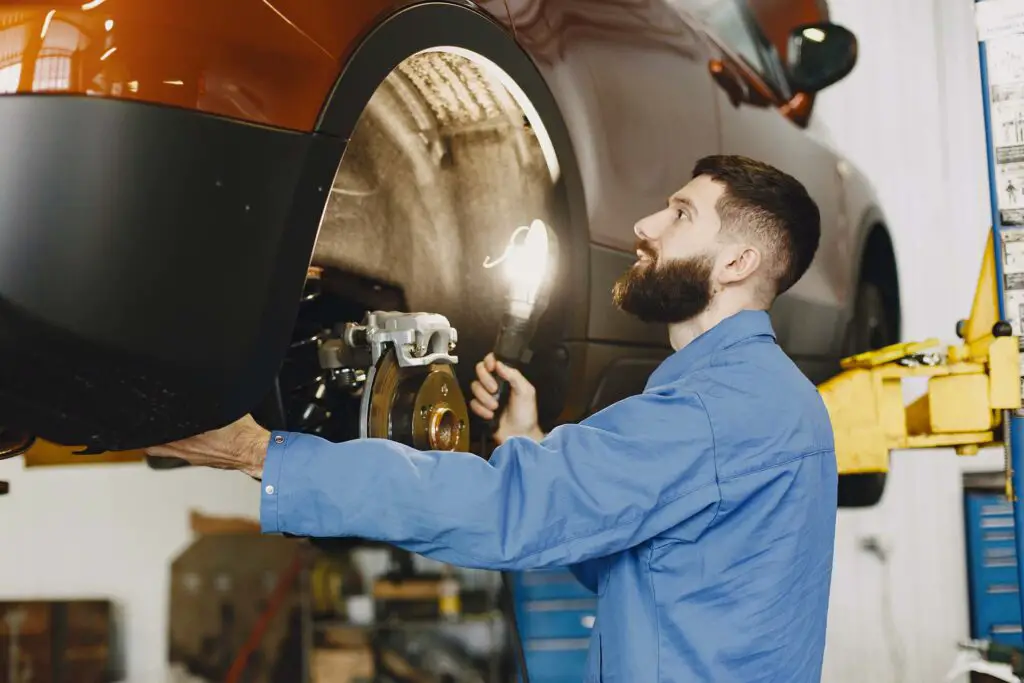Ever felt like your wallet took an unnecessary hit after a visit to the repair shop? You’re not alone. But what can you do if you think you’ve been ripped off by a mechanic? It’s a journey through the world of vehicle maintenance, where sometimes the road gets a bit bumpy with overcharges and unnecessary car services. Let’s explore how to spot these pitfalls and what steps to take if you find yourself in this all-too-common predicament.
Revving Up Your Rights – What Can You Do if You Think You’ve Been Ripped off by a Mechanic
If you have suspicions, start by calmly discussing your concerns with the service provider. Document all interactions, services, and charges. If unresolved, seek a second opinion to validate the necessity and cost of repairs. Report the issue to relevant consumer protection agencies and consider legal recourse if necessary, especially if there’s clear evidence of fraud.

Under the Hood – Understanding the Basics of Auto Repairs
Imagine this – you take your ride in for a simple oil change, and suddenly, you’re faced with a laundry list of “urgent” repairs and a bill that makes your heart race. Unfortunately, it’s a scenario that’s all too familiar for many vehicle owners. According to a study conducted by American Trucks, about 35% of them have fallen prey to auto repair scams at least once in their driving career.
This is where understanding the basics of repairs becomes more than just handy – it’s crucial. Knowing the fundamentals of what goes on under the hood of your four-wheeler can be your shield against being misled. It helps you distinguish between a genuine maintenance need and an unnecessary upsell, ensuring that your visits to the mechanic are both necessary and justified.
Here Are the Most Common Repair Services and Their Typical Price Ranges
As a vehicle owner, it pays to be informed about the most common repairs and their typical price ranges. This knowledge not only prepares you for routine maintenance but also helps you avoid overcharging for car repairs. After all, most auto services are simple maintenance checks, and they shouldn’t be super expensive.
Here’s a breakdown of the most common repairs and their typical price range:
| Oil Change | $35-$75 |
| Brake Pad Replacement | $200-$600 |
| Tire Replacement | $50-$150 each |
| Battery Replacement | $45-$250 |
| Air Conditioning Repair | $380-$450 |
Red Flags on the Road – Spotting Signs of Auto Service Fraud
No matter if you’re behind the wheel of a small city car or a trusty family SUV, the risk of falling victim to mechanic overbilling is a road hazard all drivers can potentially face. It’s an unfortunate truth in the automotive world – not every mechanic’s garage is a haven of honesty.
Recognizing the warning signs of overcharging or unnecessary repairs is crucial for both seasoned and new drivers looking for the perfect four-wheeler, and it’s not just about safeguarding your wallet. It’s also about maintaining trust with your chosen mechanic – after all, you’ll visit them plenty of times throughout your driving career. Here are some common indicators that you should switch things up:
- The mechanic’s explanation of the problem keeps changing or is unclear,
- You’re being pressured into agreeing to repairs on the spot without the chance to get a second opinion,
- Not receiving an itemized bill that clearly explains each charge,
- The shop is unwilling to give you a written estimate or guarantee for the work,
- The repairs done don’t seem to address the initial problem you brought the vehicle in for,
- You’re being recommended services and parts that seem unrelated to your car’s current issue,
- The mechanic fails to show you the old parts that were supposedly replaced,
- It’s difficult to get clear answers or updates about the progress of your car’s repair,
- Your vehicle develops new, unrelated problems shortly after being serviced.

Quick Action Guide – Immediate Steps to Take After Suspecting You’ve Been Ripped Off
When the suspicion creeps in, the first step is to approach the service center with your concerns. It’s important to do this calmly and professionally, armed with specific questions about the whole ordeal. Clearly communicate your doubts and ask for a detailed justification of the work done and the charges applied.
If your doubts persist after this, documenting auto repair issues and everything concerning this predicament is crucial. Good record-keeping can provide a strong foundation if the situation escalates further. Here’s what you should gather:
- Invoices and receipts related to the service,
- Detailed service descriptions,
- Photographs of the vehicle before and after repairs,
- Previous vehicle service records,
- Mechanic’s statements and estimates.
Seeking a Second Opinion on Car Repairs Is the Way to Go
Just like getting a second opinion from a doctor is always crucial, choosing a reliable mechanic to look over your case can make or break the whole experience. A fresh set of eyes from another professional can provide a neutral perspective on whether the repairs were necessary and if the charges were reasonable.
Be upfront about your concerns and what you’ve been told by the previous mechanic. This step can be particularly illuminating, confirming your suspicions about the initial service. Additionally, the second opinion serves as an added layer of evidence should you need to take further action against the original provider.

Your Toolkit for Justice – Taking Legal Action Against Mechanics and Understanding Consumer Rights in Auto Repairs
In this intricate world of automotive repairs, a myriad of vehicle repair laws are in place to protect consumers, though they can vary significantly from state to state. Understanding these laws is crucial when you believe you’ve been wronged by a mechanic. Here’s an overview of some common legal protections:
- Magnuson-Moss Warranty Act – protects consumers from being denied warranty coverage unjustly,
- Consumer Fraud Acts – these laws protect against deceptive business practices and may apply to fraudulent repair work,
- Lemon Laws – while typically associated with buying a car, some states’ lemon laws also cover repeated unsuccessful repair attempts for the same issue,
- State Regulations for Repair Shops – many states have specific regulations that repair shops must follow, including providing written estimates and obtaining customer consent for any additional work,
- Small Claims Court – for disputes involving smaller sums, small claims court can be a viable option to seek resolution.
How to File a Complaint With Relevant Authorities or Automotive Consumer Protection Agencies
By filing a complaint, you’ll be able to not only deal with your particular problem but also contribute to a larger effort in maintaining ethical standards in automotive services. A well-documented complaint can alert authorities to potential misconduct and prevent others from falling victim to similar practices.
To undergo this task, start by identifying the appropriate authority. This could be a state consumer protection office, a state department of motor vehicles, or a local Better Business Bureau (BBB). Prepare a concise but thorough description of your experience, including all relevant details of the repair.
Attach copies of all documentation, including receipts, estimates, and any correspondence. Submitting your complaint online is often possible, and in some cases, you may need to mail or hand-deliver your documentation.

Safeguarding Your Ride – Proactive Preventive Measures for Future Auto Repairs
Prevention is better than cure, and this adage holds especially true in the world of auto repairs. By taking proactive steps, you can significantly reduce the risk of falling prey to unscrupulous practices down the road. Let’s explore how these proactive measures can keep your prized ride running smoothly down the most famous routes in the US:
Choosing a Reputable Repair Shop
Repair shop reliability is the most important aspect. Look for a shop with a strong reputation backed by positive reviews and recommendations from trusted sources. Check for certifications like ASE (Automotive Service Excellence) and affiliations with reputable organizations.
A trustworthy repair shop will be transparent about its services, provide clear estimates, and communicate openly throughout the process. A bit of research now will provide you with peace of mind for all your future repair needs.
Understanding the Basics of Vehicle Maintenance
Having a few car maintenance tips under your belt helps you make informed decisions down the road. Familiarize yourself with your vehicle’s maintenance schedule, common wear and tear signs, and the basics of how your car operates. This doesn’t mean you need to become an expert mechanic, but knowing the fundamentals can help you communicate more effectively with your repair shop.
Use Online Auto Repair Advice Forums
In the digital age, forums are invaluable resources, and not only when you’re planning to buy a car online. You can seek advice, share experiences, and get recommendations for specific issues or repair shops. Forums like Reddit’s r/MechanicAdvice or automotive sections on Quora can offer diverse opinions and insights, helping you to better assess your car’s needs.
Full Throttle Forward – Steering Clear of Auto Repair Pitfalls
As we roll to a stop on this journey through the sometimes bumpy terrain of auto repairs, remember that knowledge is your ultimate co-pilot. By understanding your vehicle and asserting your rights, you’re setting the course for smoother, scam-free automotive experiences. Stay proactive, ask questions, and trust your instincts. You’re now in the driver’s seat, ready to navigate the whole ordeal with informed confidence and peace of mind.
FAQ
What Should I Do if a Mechanic Refuses to Provide a Written Estimate?
If a mechanic refuses to provide a written estimate, it’s a red flag. Always insist on a written quote before any work begins, as this is your proof of what was agreed upon. If they still refuse, consider it a sign to find a more transparent and trustworthy service provider.
Are There Specific Certifications or Qualifications I Should Look For in a Trustworthy Mechanic?
Yes, look for mechanics who are ASE (Automotive Service Excellence) certified. This certification indicates a high level of professionalism and expertise. Additionally, mechanics affiliated with well-known automotive associations or those who have manufacturer-specific training are often more reliable.
How Can I Check if a Mechanic Has a History of Fraudulent Practices?
You can start by checking online reviews on platforms like Yelp or Google Reviews. Additionally, you can contact your local Better Business Bureau or consumer protection agency to see if any complaints have been filed against the mechanic or their shop. This due diligence can help you avoid unscrupulous service providers.








